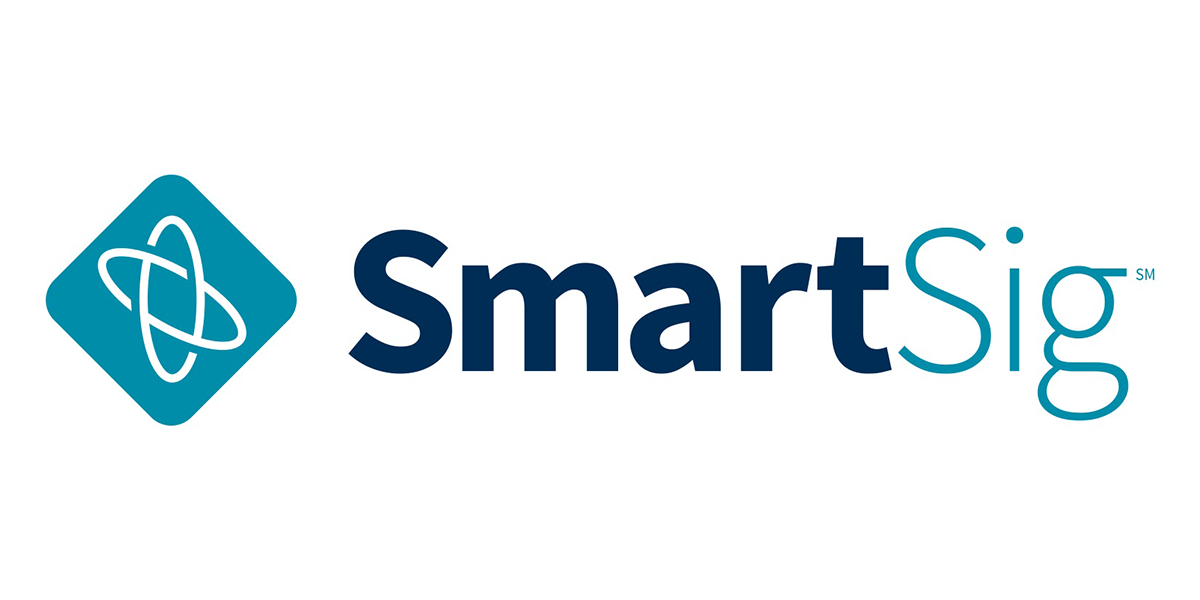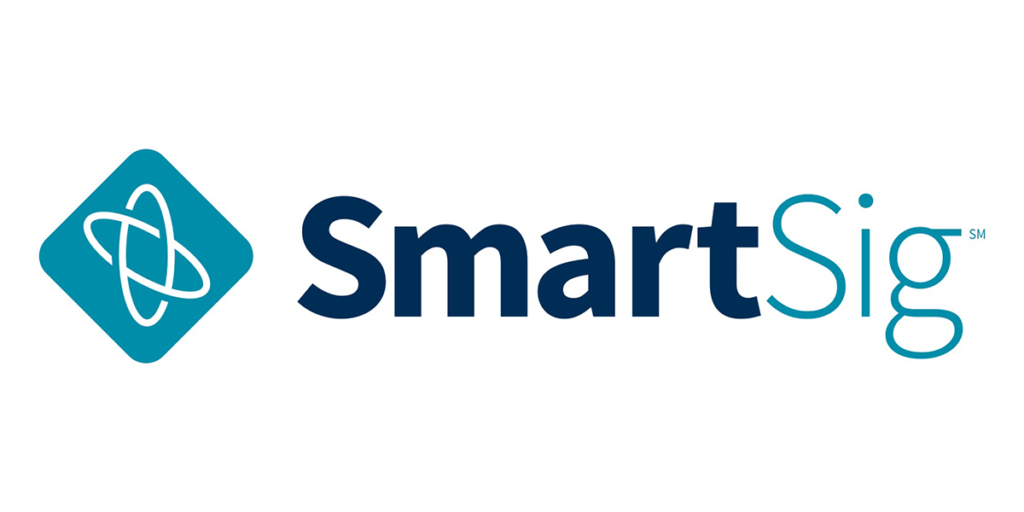Integrated workflows ease staff burden and satisfy regulatory mandates.
DrFirst’s Next-Generation SmartSig 2.0 Solution Improves the Quality of Medication History to Help Protect Patients From Adverse Drug Events


June 30, 2020
DrFirst’s Next-Generation SmartSig 2.0 Solution Improves the Quality of Medication History to Help Protect Patients From Adverse Drug Events
Patented artificial intelligence accurately translates 93% of imported prescription information, improving reconciliation accuracy and workflow efficiency
Rockville, Md., June 30, 2020 – Healthcare technology pioneer DrFirst today announced the release of the next generation of its SmartSig technology, which uses patented artificial intelligence (AI) to improve the quality of patient medication history when it is imported into hospitals’ and health systems’ electronic health record (EHR) systems. Clinicians use the imported information for medication reconciliation, which is recommended every time a patient is admitted, transferred, or discharged from a healthcare facility. Accurate medication reconciliation is a National Patient Safety Goal of The Joint Commission.
SmartSig 2.0 accurately translates nearly 93% of incoming prescription information, called sigs, helping avoid medication errors and saving up to 30 seconds of work for each drug entered during the medication reconciliation process. This time savings can add up to several thousands of hours in a month, depending on the size of the hospital or health system. For a mid- to large-size hospital reconciling more than 2 million patient medications in a month, this could save more than 200,000 work hours per year.
In an initial study with six health systems, SmartSig 2.0 further enhanced the quality of structured and codified sigs over the previous version. Sig translations from free text increased by an average of 11% with the next-generation technology, compared to SmartSig 1.0, which already improved translation and inference by up to 82%. The early adopters include Covenant HealthCare (Saginaw, Mich.), King’s Daughters Medical Center (Brookhaven, Miss.), Lafayette General Health (Lafayette, La.), Maimonides Medical Center (Brooklyn, N.Y.), and St. Claire HealthCare (Morehead, Ky.).
“SmartSig 2.0 represents a dramatic leap forward in quality for medication history,” said Rebecca Sulfridge, Pharm.D., an emergency medicine clinical specialist with Covenant HealthCare in Saginaw, Mich., which has integrated DrFirst’s MedHx solution into its EHR. “We are spending less time reconciling medication histories manually, and in the first month of use, we recaptured an additional 15% productivity per shift, which represents approximately $650,000 per month, while also improving patient safety and outcomes. This is especially helpful during the COVID-19 pandemic when we are trying to minimize any additional patient risks and protect staff from unnecessary face-to-face exposure.”
On discharge, an estimated 66% of data is missing essential prescription instructions, or sigs, increasing the risk of adverse drug events that compromise patient safety. In addition, the wide variability of sig terminology presents a more significant challenge than most people might imagine for translating and structuring the data, said G. Cameron Deemer, president of DrFirst. “Even a simple prescription instruction, such as ‘take one tablet by mouth once daily,’ can have hundreds of text variations,” he explained. These gaps in prescription histories complicate the medication reconciliation process, often requiring clinicians and staff to spend hours conferring with pharmacies and other providers to gather missing sig details and then manually enter them.
DrFirst’s SmartSig is incorporated into the company’s MedHx solution, which provides more complete, clean, and consumable patient medication history for the medication reconciliation process. When medications are imported into EHRs, sigs associated with them typically arrive as unstructured free text, often with missing pieces of information and using a variety of terms for the same instructions (e.g., “by mouth” vs. “orally”) which makes the process of entering the medications labor-intensive and increases the risk of adverse drug events (ADEs).
SmartSig AI addresses these challenges by producing accurate, structured, real-time translations. The technology converts free text elements of medication sigs into a health system’s standard terminology and processes the data into appropriate fields so that it becomes functional within the EHR. With better and actionable data, health systems’ EHRs can more accurately trigger critical safety checks, such as drug interactions and allergy alerts.
A recent study by the University of Michigan reveals that quality issues due to free-text sigs also negatively impact pharmacy workflow and endangers patients, requiring pharmacists to manually edit 84% of electronic prescriptions to create accurate patient labels, which can still introduce human errors. The study, published in May by BMJ Quality & Safety, concludes that “development of tools and techniques such as a comprehensive set of structured direction components or machine learning-based natural language processing techniques may help produce clear directions.”
The AI this landmark study calls for is “exactly what SmartSig delivers,” said Deemer. “SmartSig’s patented AI is a game-changing solution that nearly perfects the quality of converted free-text sigs and drastically reduces the amount of time staff must spend verifying and reconciling medication histories,” he added. “More importantly, SmartSig has the potential to reduce adverse drug events, which are blamed for more than 100,000 deaths per year.”
First implemented in 2015, SmartSig now serves health systems across the U.S. and Canada as part of DrFirst’s MedHx solution, processing millions of pieces of information daily. Early adopters of SmartSig 2.0 within MedHx have successfully integrated the solution with all the major EHRs in the U.S.
About SmartSig
SmartSig, with DrFirst’s patented AI is a key part of the company’s SmartSuite of solutions, which also includes SmartSearch, SmartStrings, SmartDrug, and SmartScan. SmartSuite’s AI allows health systems and pharmacies to dramatically improve their workflow by enhancing the usability of data, making it structured and codified. Driven by DrFirst’s patented artificial intelligence and machine learning technology, SmartSuite continually learns, getting smarter and smarter over time and further reducing clicks and keystrokes.
About DrFirst
Since 2000, DrFirst has pioneered healthcare technology solutions and consulting services that securely connect people at touchpoints of care to improve patient outcomes. We create unconventional solutions that solve care collaboration, medication management, price transparency, and adherence challenges faced in healthcare. We unite the Healthiverse by providing our clients with real-time access to the information they need, exactly when and how they need it – so patients get the best care possible. DrFirst solutions are used by nearly 300,000 healthcare professionals, including more than 100,000 prescribers and more than 1,400 hospitals in the U.S. and Canada. To learn more, visit DrFirst.com and follow @DrFirst.
###
DrFirst Media Contact
Sofia Kosmetatos
Amendola Communications
646-431-8423
skosmetatos@acmarketingpr.com

